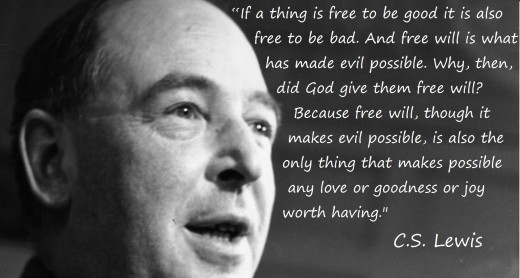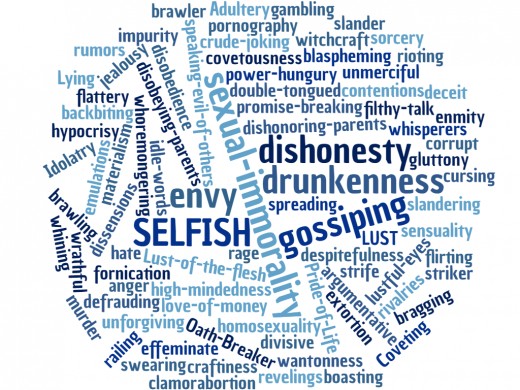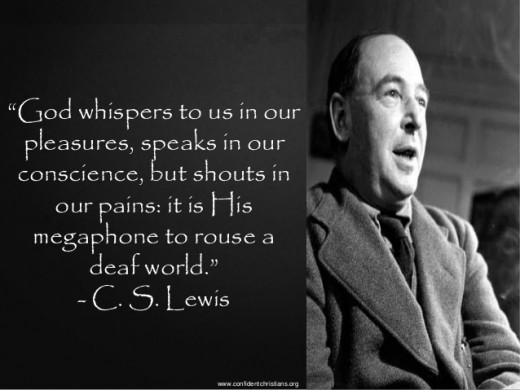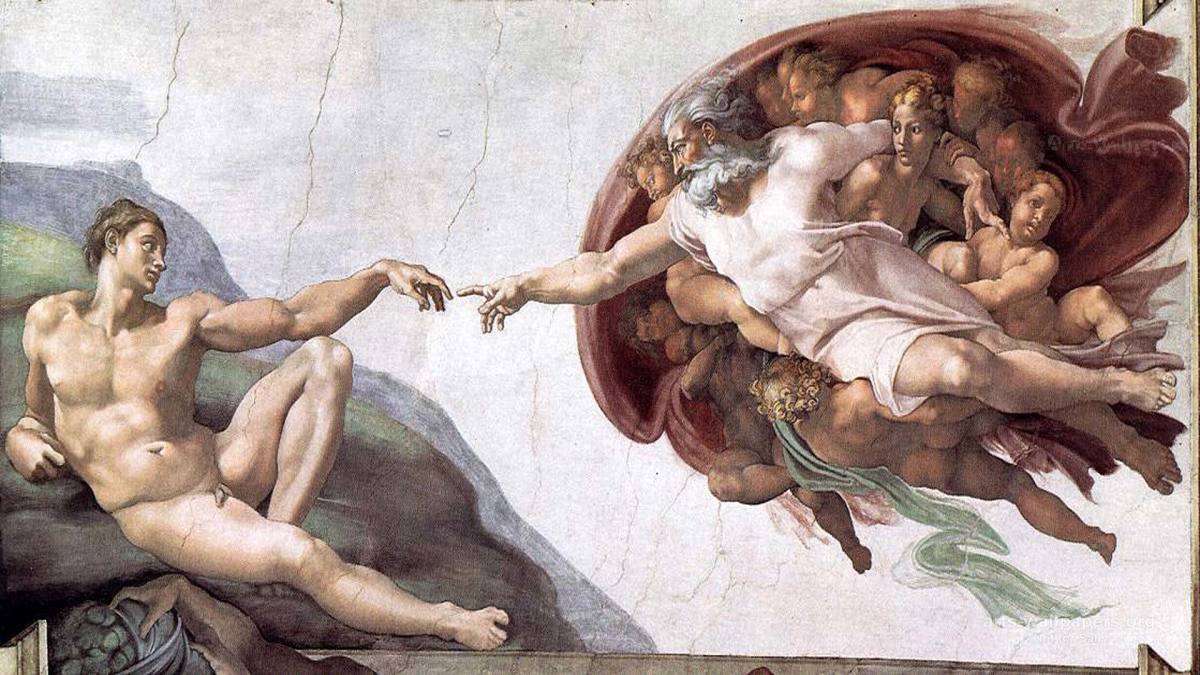God, and the Problem of Suffering
A Christian Perspective on Suffering
My references to suffering within this article allude to those circumstances where pain and grief seem to exclude hope of joy and peace.
Most people won’t complain much over a paper cut, but the physical pain of severe burns or the despairing emotional pain at the loss of a child will often cause people to question the existence of God, or at least His care for them.

The real quandary for many is why the innocent suffer
I've yet to hear anyone say: “If there’s a God, why did he allow Hitler to suffer?” But have heard of many reject God after the death of a child or other severe "unfair" trauma.
This is an attempt to address the problem of suffering in a world the bible says was created by an all-powerful and all good God.
I, as always, lean on the wisdom of others who have gone before me, some of whose writings you may recognise in the course of this article. If I could, I would offer a special thanks to C.S. Lewis.
The Problem
“If God were good, He would wish to make His creatures perfectly happy, and if God were almighty He would be able to do what He wished. But the creatures are not happy. Therefore God lacks either goodness, or power, or both.”
This has been a question re-coined down through the ages. It is a good question as questions go, one requiring serious consideration.
However, to hope to answer this question correctly, requires seeing things through God's eyes, or at least attempting to; as far as is possible for we mortals—accepting that there will be things we can't understand.
The Problem with the Question
Looking more closely at the above question, we see it has flaws, in that it assumes too much. It assumes...
- ...that God sees the problem of our suffering in the same light we do
- ...that God wills His creation to be perfectly happy on this earth
- ...that God and man's idea of good are one and the same
- ...that He hasn't done anything

Can God Do the Impossible?
In attempting to answer the problem of suffering in light of a God considered all-powerful and good, we must first understand what is meant by those terms, as well as the context in which God might desire human happiness.
I have never been asked questions about God and suffering when I am travelling in countries riddled with the realities of it. In fact, when I visit churches in parts of the world where they are faced daily with horrific affliction, I normally leave inspired. They trust God in everything, even when things are going well. When times are hard, they cling to God because they have already learned to trust Him. They have learned that God does not change, even when our circumstances have.
— Michael Ramsden is European director of RZIMWhen we read in the Bible that, “with God all things are possible” (Matt 19:26), we shouldn't assume that this statement can be applied in all and every senses. Else we will come up with some rather nonsensical conclusions that contradict all common sense and wisdom.
For example, we cannot use this passage to make the claim, “God can exist and not exist”, or that "He can create and destroy an object at the same instant”. Such silly conclusions are not supported by this passage. In context Christ is saying that things impossible to man are possible with God. All things that are possible to do, God can do.
God's almighty power is founded in the fact that He can do all that is intrinsically possible to do, not intrinsically impossible. That is to say that God can do all things that are in accord with something’s core nature, but cannot do that which contradicts that fundamental nature.
This is why we read it is impossible for God to lie (Titus 1:2); it goes against His intrinsic nature. This is not a contradiction of Matthew 19:26 where it says, “all things are possible with God”, because that passage is not referring to the fundamentally impossible.

God's Limits
For the same reason, God cannot make sin good. Sin –that which is opposed to the will of God– cannot be seen as good in Gods eyes, nor can He make it so.
He cannot make something both light and dark at the same time, for the core trait of darkness is the absence of light, therefore not even God can make them one in the same thing.
Nor can God force a man to repent, for biblical repentance comes from the core trait of free will. Therefore to ‘force repentance’ is an oxymoron.
One may attribute miracles to God, those things outside human ability or natural phenomenon, but not nonsense.
If you choose to say, “God can give a creature free will and at the same time withhold free will from it,” you have not succeeded in saying anything about God: meaningless combinations of words do not suddenly acquire meaning simply because we prefix to them the two other words “God can”. God cannot do the intrinsically impossible, not because His power meets an obstacle, but because nonsense remains nonsense even when discussed with God in context. (C.S.Lewis)
Did God Create Evil?
If we interpret evil as opposition to the will of God, then no, God did not create evil. It is illogical for God to will to create that which is in opposition to His will. Rather, evil must be understood as Gods Antithesis. God's will is holy because He is God. Any will opposed to His is therefore not holy, rather it is evil because it is not of God. In creating beings with free-will, the potential for evil came into existence. Not because it was created, but because God has a will.
An analogy might be a parent and child. The parent has a will for the child. The child chooses to ignore the will of the parent. We would agree that the child has been naughty. Did the parent create their naughtiness?

Human Power & Weakness
Van Inwagen gave the classic free-will explanation of the existence of evil:
"To ask God to give me free choice between x and y and to see to it that I chose x instead of y is to ask him to do the logically impossible."
Which brings us back to the question: Is human suffering something that God is powerless to stop, or something He chooses not to stop for reasons other then personal weakness.
Maybe it is not weaknesses inherent in God that prevents him, but weaknesses inherent in us.
After all, Christian theology declares humanity to be in a serious predicament. Hinging, ironically, on the fact that God made man a free moral agent; able to walk their own path, make their own decisions, behave as they choose.
But why is this the core of the predicament to the problem of suffering?
Well, quite simply, because man chooses to live much of his/her life in opposition to the will of God. The bible calls this Sin. And sin causes suffering.
There is only two ways God could put a stop to human earthly suffering.
-
He could destroy every sinner, or
-
He could take away man’s free choice.
However the bible clearly says that all men sin (such that, to various degrees, we all contribute to suffering), therefore he would have to destroy everyone.
Yet the bible also says that after death comes judgement, and the scriptures are very clear about the soul unprepared for that event—and that would hardly be solving our problem.
To ask God to give me free choice between x and y and to see to it that I chose x instead of y is to ask him to do the logically impossible.
— Van InwagenA Note on Hell
2 Peter 3:9 tells us that God doesn't wish anyone to perish eternally—he does not desire for us to suffer.
As hard as the topic of hell is, it remains a clear biblical teaching. However, for this writer the sufferings represented by such a domain finds definition not in deliberately placed tortures but in the fact that it is a place devoid of God; where God has withdrawn his influence and power and presence.
Such a place, absent of the source of good, has become devoid of anything good. All that man cherishes as a blessing are absent in hell; light, warmth, hope, sight, sound, touch...
And that is why God doesn't simply destroy the world and the sinners in it; for most of mankind that would simply be a case of ‘out of the frying pan into the fire’.
As to removing man’s free choice, such an act would make man no more than a puppet or a machine. God doesn’t want drones, that wasn't his intent in creation. He wants men and woman to do His will because they choose to, because that's what they were designed to do; because that is how they exist to the fullest.
Suffering Poll
How is your life at present?
Therefore we see that God is in a seeming impossible position
But not because He lacks power. He could destroy all that He has made in an instant. Rather it is impossible because at its root the cause of man's suffering, his free will, is something God has chosen not to overrule — but which man refuses to surrender.

As a free moral agent, man's actions are up to him; his choices are not predetermined. Therefore man is free to make the wrong choices, to hurt himself, and to hurt others. If God is to allow man to be fully man, He must allow man that freedom; and God allows man such freedom for man’s own good. -- Would you prefer to be a robot, a puppet?
He allows this freedom for the good of others. Our freedom means we are free to sacrifice, to love, and to serve others.
He also allows this freedom for God’s glory. He made man to glorify his God, but there is no glory in man’s serving his Creator if man has no alternative.
Perhaps we can conceive of a world in which God corrected the results of this abuse of free will by His creatures at every moment: so that a wooden beam became as a blade of grass when used as a weapon, & the air refused to carry my voice if my words were harsh, dishonest, or rude. However in such a world, painful words & actions would be impossible, but so also would be the ability to exercise one's free will; & therefore in this type of world you have done away with life as we know
— C.S. LewisSo is God powerless to resolve mankind's predicament?
As we’ve see, God cannot simply end man’s earthly suffering, because the cure would be worse for man than the problem, and therefore unacceptable to God.
However, God has done what he can, God came into our history. He became human like us!
From Hebrews we read, “But we do see Him who has been made for a little while lower than the angels, namely, Jesus, because of the suffering of death crowned with glory and honor, that by the grace of God He might taste death for everyone” (Hebrews 2:9; see also Hebrews 1:1- 3; 4:14-16).
Although God, because of mans rebellion and sin, cannot practically remove earthly suffering (not even Christ could avoid that), He provides a way for His sinful creation to escape eternal suffering and gives them the hope of home in heaven with Him, where there will be no more suffering.
Most of Mankind Rejects God's Solution to the Problem
However, according to the Bible, God’s solution to the problem will not appeal to the majority of mankind. And the reason...
Because they prefer their own will; either refusing to believe or not caring what God says or has done.
And that raises an interesting point - God Suffers. He suffers from man’s sin, should He then remove the cause of His suffering?
And that leads us to God's goodness. A God, the Bible teaches, toward whom we have caused grief, and yet he still shows mercy and patience; even willing to suffer in our place.

God's Goodness
On the one hand, if God is wiser than we, His judgement must differ from ours on many things, and not least on what is good and evil. What seems to us good may therefore not be good in His eyes, and what seems to us evil may not be evil to God (Many passages in the scriptures tell us this).
Nowadays when most refer to God's goodness they make a vague allusion to His love for them and all mankind, and when they speak of His love they inevitably allude to His acceptance of them. In fact what would really satisfy most people would be a God who said of anything they happened to choose to do, “What does it matter, so long as you are contented.”
People want a God whose main plan for the universe is that “A good day was had by all”. But that is not in Gods agenda, not because He doesn’t want man’s happiness, but because He acknowledges that sin has made that impossible.
The surprising thing for many people to find is that because God is good, He actually uses suffering as a tool in an attempt to change people. Because pain insists upon being attended to, therefore God uses it. He whispers to us in our pleasures, speaks to us in our conscience, but shouts in our pains: it is His megaphone to rouse a deaf world.(C.S.Lewis)
You see, a contented sinner will never acknowledge their need for God; the fact they’re lost. But shake that sinners life up and you just may get them to see their state, and maybe, just maybe, get them to repent, be saved, get to heaven, and what will the troubles of this world matter after a thousand years in heaven, especially if it was those very troubles that provided the catalyst for your salvation.
Therefore we see that the very suffering man sees as evil and unjust, God may be using to try to save his creation, by getting them to see their sin, there lost state, and the fact that all men will die, and then face judgement at the feet of God.

Even the Christian Suffers
The book of Job asks the question: “Why do the righteous suffer?”
In Psalm 73 the Psalmist noted the prosperity of the wicked and concluded that it was useless to try to live righteously .
Habakkuk asked how God could be silent “when the wicked swallow up those more righteous than they” (Habakkuk 1:13). Or, as someone put it, “Why is God silent while evil rages?”
Ironically, it seems it is hardest is to turn our thoughts to God when everything is going well with us. The default behaviour in having everything that we want means we fail to notice that God wants to give us something better; but he cannot because our arms are full.
To get us to listen to His offer, what can God do but make our lives less agreeable to us by taking away the sources of false happiness; and this allusion of happiness is often strongest in some very honest, kind, and temperate people, and on such therefore, misfortune must fall.
CS Lewis gives a good analogy concerning the humble dog.
Now the dog is by human standards one of the best of creatures, a proper object for a man to love, therefore man interferes with the dog and makes it more lovable than it was in mere nature. In its state of nature it has a smell, and habits, which frustrate man’s love: so he washes it, house trains it, teaches it not to steal, and is so enabled to love it more completely. To the puppy the whole proceeding would seem, if it were a theologian, to cast grave doubts on the goodness of man: but the full grown and full-trained dog, now admitted, as it were by grace, to a whole world of affections, loyalties, interests, and comforts entirely beyond what it could have expected if allowed to remain wild, that full grown dog would have no such doubts as to the goodness of its master.
It will be noted that the man takes all these pains with the dog, and gives all these pains to the dog, only because it is an animal high in the scale-because it is so nearly lovable that it is worth his while to make it fully lovable. He does not house-train the earwig or give baths to centipedes. We may wish, indeed, that we were of so little account to God that He left us alone to follow our natural impulses-that he would give over trying to train us into something so unlike our natural selves: but once again, we are not asking for more love, but for less.
God often allows suffering because He loves.

The Spiritual War
The bible speaks of another reason for suffering which this article will not address further, other then to mention it (and let the reader pursue).
That reason is spoken of eloquently in the letter to the church in Ephesus (6:12), which reads:
For our struggle is not against flesh and blood, but against the rulers, against the authorities, against the powers of this dark world and against the spiritual forces of evil in the heavenly realms.
It is not just God at work in this world. Although God is completely in control, he allows this battle to take place, even wills it for reasons we may not be able to comprehend. But just as in Job's case, when in the midst of fiery trial it is not our place to accuse God of injustice and abandon him, but instead to entrust ourselves to him through it. We are promised ultimate victory when we do.
We are called not to see things through our eyes, but through Gods
This article has not specifically addressed the issue of suffering as the result of the environment, I.e. natural disaster etc.. However, the bible answers this question also... which I may write about in a future article.
- Apologetics Press - The Problem of Suffering
Apologetics Press, Inc.
- The Love Wounding of the Spirit
What a peaceful scene. A Psalm 23 picture. A quiet place beside still waters. I love this and oh to be sitting there soaking in all the sounds and smells along with the sight. Its here in the imagination...
© 2010 Richard Parr








